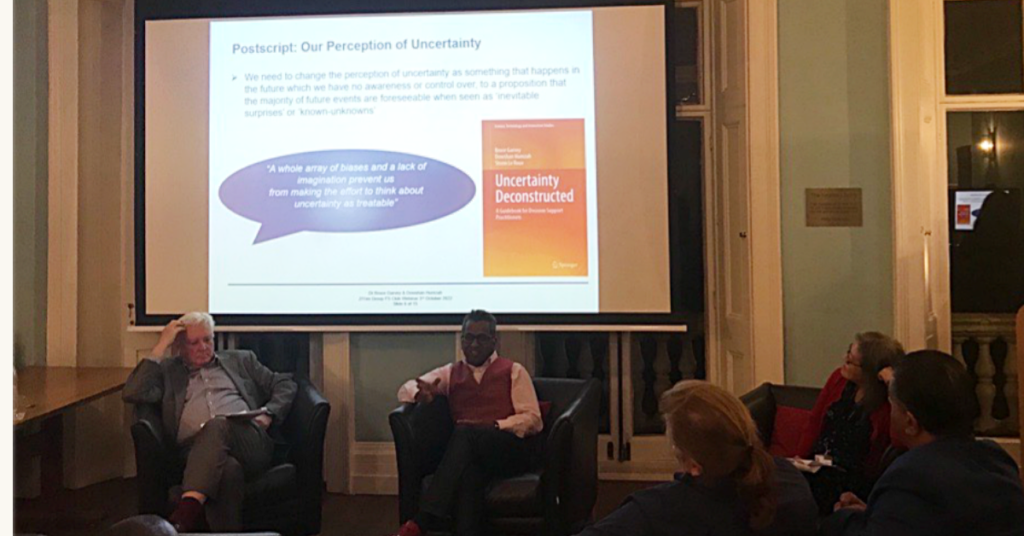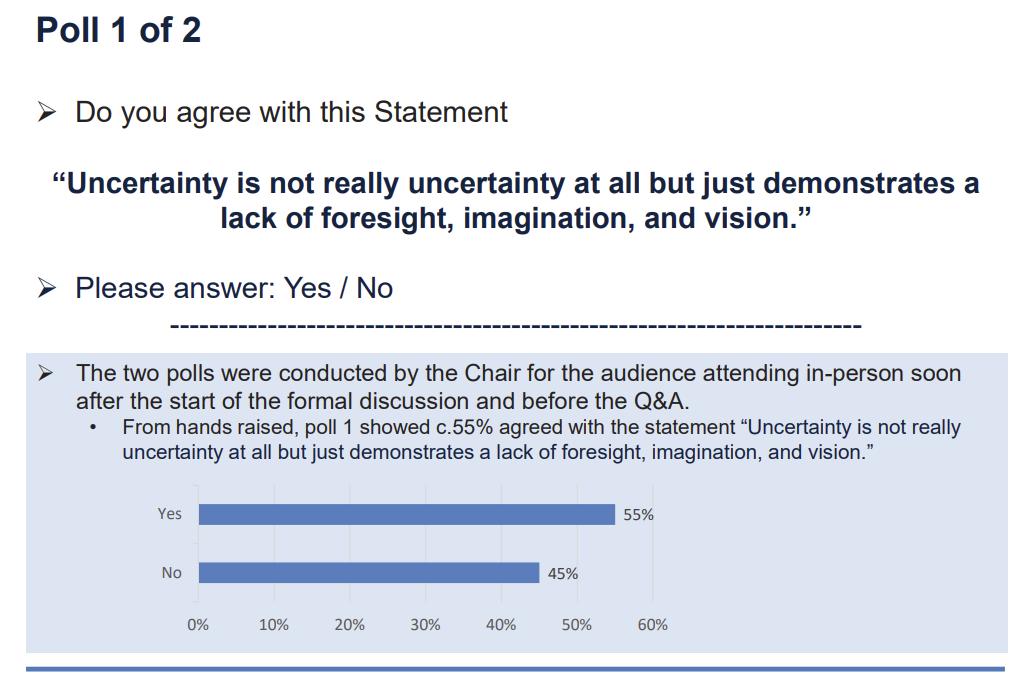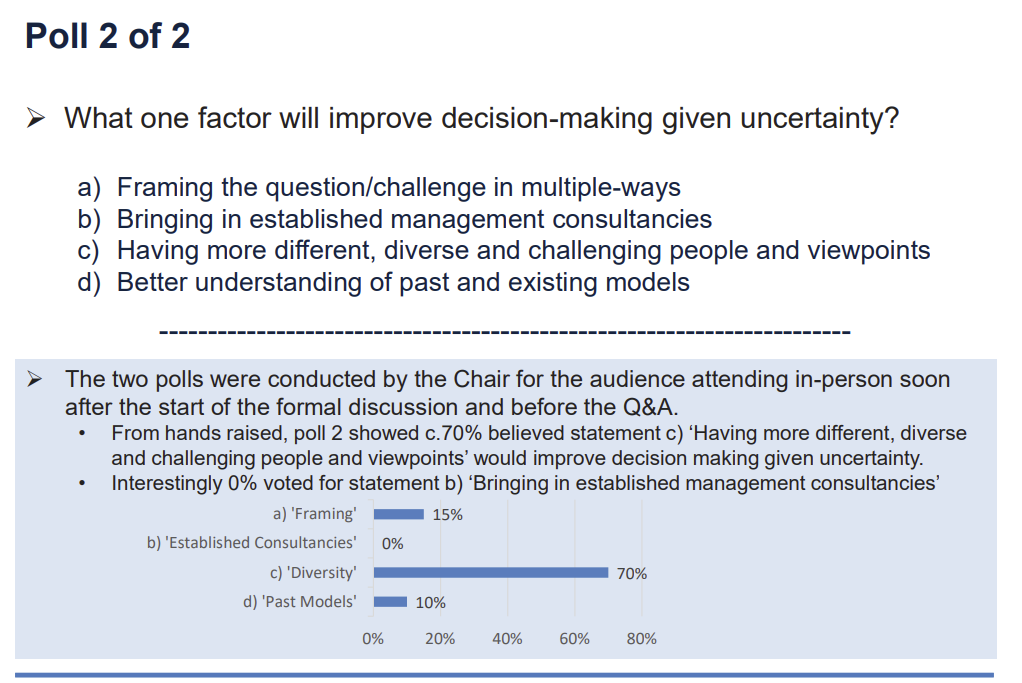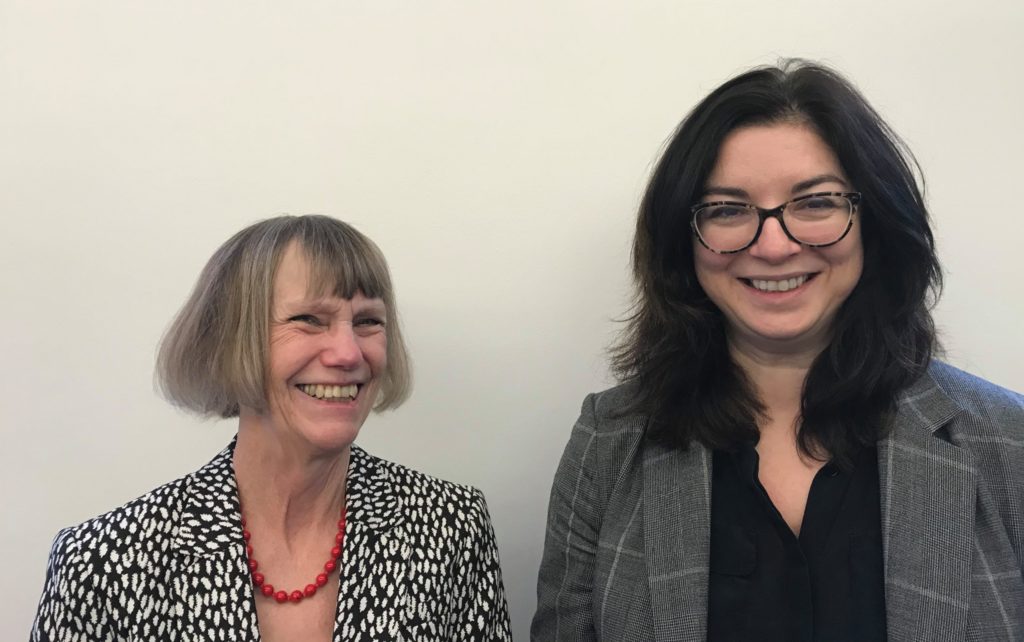We welcomed Dr Bruce Garvey and Dowshan Humzah to a conversation about their latest book co-written with Storm Le Roux, which challenges the concept of uncertainty.
On Wednesday 19 October 2022, Birkbeck’s Centre for Professional Development was delighted to welcome authors Dr Bruce Garvey and Dowshan Humzah to celebrate the launch of their book Uncertainty Deconstructed: A Guidebook for Decision Support Practitioners, co-written with Storm Le Roux.
In a week that saw the resignation of Home Secretary Suella Braverman, shortly followed by Prime Minister Liz Truss herself, it seemed fitting to consider the role of uncertainty in the political and private arena.
Is uncertainty really the villain we make it out to be, or could we better lay the blame for inaction or poor decision-making at the door of groupthink, inflexible strategy and an unwillingness to apply creative thinking to complex problems?
Based on the premise that uncertainty is not really uncertainty at all, but just demonstrates a lack of vision and willingness to think about the unthinkable, the book formed an appropriate foundation for a discussion that ranged from the current volatile political climate to managerial decision-making and harnessing our inner creativity.
Chair Dr Pamela Yeow began the discussion by inviting the authors to deconstruct the concept of uncertainty. Bruce highlighted that, prior to the financial crash, it was typical to speak of “risk” rather than “uncertainty”. Whereas risk is quantifiable, he argued that “people use the term uncertainty to talk about mess-ups that have happened on their watch.”
Attendees were invited to take part in two quick polls to facilitate the discussion. 55% agreed with the statement: ‘Uncertainty is not really uncertainty at all but just demonstrates a lack of foresight, imagination, and vision.’
The second poll, ‘What one factor can improve decision-making given uncertainty?’ had four options. The result overwhelmingly showed ‘diversity and difference’ taking the lead with nearly 70% selecting ‘Having more different, diverse and challenging people and viewpoints’. It is interesting to note, that the option of ‘Bringing in established management consultancies’ scored 0%.
If we are to meet the challenges that an ever-changing world is throwing at us, then the task of accepting that uncertainty is about exploring the possible, rather than the impossible must be taken on board by all. It is our reliance on the past and accepted models and lack of accepting maverick, even challenging perspectives, which limits us and closes opportunity space. We need more creativity, innovation and embracing difference.
While uncertainty is undoubtedly out there, we are not without the tools to understand it. The authors drew parallels between decision-making and the design process: while it may initially seem nebulous, applying a structured approach to the problem reveals greater clarity.
Dowshan called for a balance between linear, traditional approaches to problem-solving and creative, free thinking which enables us to find new solutions. He reflected on the damaging impact of silo mentalities on organisations looking to address wider issues. Discussion with the audience explored how such ideas could be applied to a range of real-life case studies, from our academic context at Birkbeck to the health service and large consultancy firms.
Asked for their key takeaways from the book, Bruce encouraged attendees to “continuously update contingency plans” and to approach management as a continuous process rather than discrete functions. Dowshan called for organisations to go beyond paying lip-service to introducing diverse perspectives: “recruit to challenge, select to challenge – do what you say”.
Further Information






 Are female leaders more efficient in family firms? Does corruption have a gendered effect on small firm performance? These are some of the questions posed at the recent Uddevalla symposium, held in the UK for the first time at Birkbeck’s Bloomsbury campus, between 30 June and 2 July. As part of its stated themes of ‘Geography, Open Innovation, Diversity and Entrepreneurship’ the symposium took time to focus on gender inequality, with
Are female leaders more efficient in family firms? Does corruption have a gendered effect on small firm performance? These are some of the questions posed at the recent Uddevalla symposium, held in the UK for the first time at Birkbeck’s Bloomsbury campus, between 30 June and 2 July. As part of its stated themes of ‘Geography, Open Innovation, Diversity and Entrepreneurship’ the symposium took time to focus on gender inequality, with